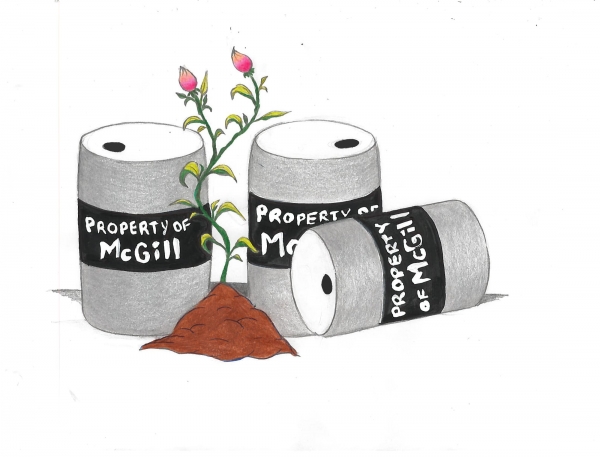Students filled Burnside Hall on Oct. 4 for Divest McGill’s ‘Divest 101’ seminar led by Jacqueline Lee-Tam, U2 Arts, and April Kowalchuk-Reid, U2 Science, hoping to capitalize on momentum from the previous week’s climate march. The event highlighted the history of the fossil fuel divestment campaign at McGill and ways that students can get involved.
One of Divest McGill’s earliest actions was submitting a divestment request to the Committee to Advise on Matters of Social Responsibility (CAMSR) in 2013, which was later denied because the committee didn’t see enough evidence of the community being harmed by this issue.
Since then, Divest McGill has submitted two more requests for fossil fuel divestment: One was also denied due to similar claims that climate change had not yet caused enough damage to the global community. The third request will be decided on later in the fall semester. Kowalchuk-Reid explained the group’s frustration with what they see as CAMSR inconsistently adhering to their mandate.
“[The] McGill Board of Governors is the highest functioning board and they ultimately have the final decision on how much money we have invested in the fossil fuel industry or if we’re involved in it whatsoever,” Kowalchuk-Reid said. “They made a subcommittee called CAMSR, [whose] sole mandate is to just look at [if] this [is] causing harm to the community [and] the environment. They […] made that committee mainly to discuss divestment and they are supposed to not be influenced by money, but that has not happened in the past.”
Lee-Tam emphasized that divestment campaigns have proven impactful in lobbying the fossil fuel industry to make changes. She further discussed the connection between money and divestment.
“[Divestment is] the idea of taking your money out of a [harmful] industry and putting your money into an industry that isn’t harmful or doesn’t cause grave and injurious consequences like whatever industry you were invested in.” Lee-Tam said. “If we get all these institutions to divest from fossil fuels, we’re removing the social license of the fossil fuel industry to operate …[and] insert[ing] awareness about the fossil fuel industry and its negative consequences into the public sphere.”
Despite other institutions, such as the University of California, divesting from fossil fuels, divestment at McGill has remained an elusive and opaque process. This is often due to CAMSR’s mode of operations and differing ideas of what it means to be transparent and inclusive.
Laura Mackey, U3 Environment, expressed her frustration with the results of her attempts to encourage transparency in the CAMSR evaluation process.
“When we found out [that CAMSR was] going to be revisiting divestment, one of the things that we specifically asked for was to be included in the conversation,” Mackey said. “I think if they were asked that question, they would say [that they had] included [us] in the conversation, but for us it’s very much felt the same as always where we’re on the outside, watching these internal deliberations that we don’t really know what they’re talking about or what’s happening. We just hope they’re paying attention to the mood on campus and the things our campaign is doing.”
Julia Elson, U4 Engineering, attended to learn about more effective ways to be involved in environmental protection following the march.
“I think that taking the energy that we’ve gained from the march and channeling that into something like an advocacy campaign […] will give you a lot more value for your time than sitting and being frustrated about it,” Elson said.








